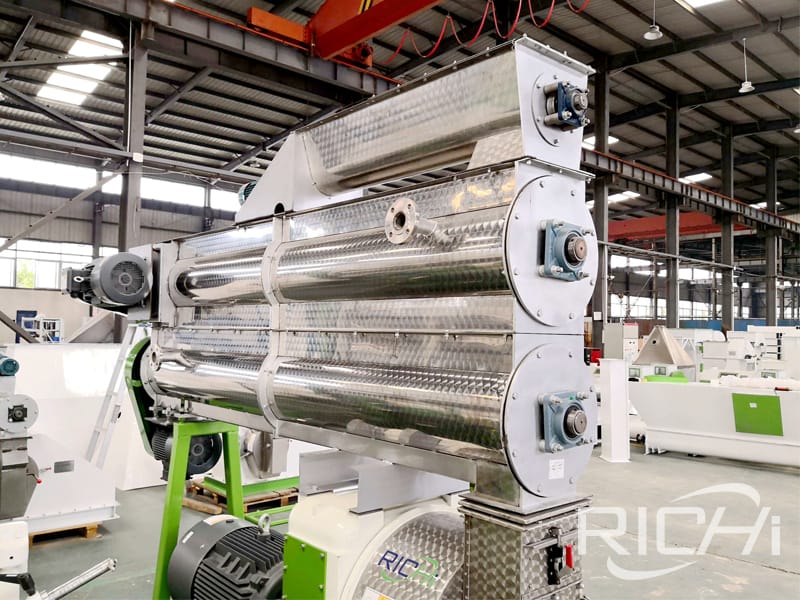As alfalfa is so widespread all over the world, people pay more attention on how to make full use of alfalfa. A good choice is to make alfalfa pellets with pellet maker. Alfalfa pellets are mainly used as animal feed, but they can also be used as energy fuel, sometimes.

Benefits of Making Alfalfa Pellets
Alfalfa is known as the “Queen of Forage” due to its rich nutritional value and versatility. Turning alfalfa into pellets through a professional alfalfa pellet machine not only increases its economic value but also makes it easier to store, transport, and use. The pellets are clean, uniform, and multifunctional.
- As Animal Feed: Alfalfa pellets are rich in protein, fiber, calcium, and vitamins, suitable for poultry, cattle, sheep, horses, and rabbits. They improve digestibility, reduce feed waste, and enhance animal growth rates.
- As Biomass Fuel: Dried alfalfa can be made into biofuel pellets with high combustion efficiency and low ash content. It’s a renewable and eco-friendly energy source for heating or industrial boilers.
- As Organic Fertilizer: Alfalfa pellets contain around 5% nitrogen, plus natural plant growth regulators like triacontanol, making them an excellent fertilizer for gardens and organic farms.
How to Make Alfalfa Pellets Step by Step
Do you know how to make alfalfa pellets? The process involves several stages that ensure proper moisture, particle size, and density for high-quality pellets.
Alfalfa pellet making machine can be divided into flat die pellet mill and ring die pellet mill. With pellets making machine, you can turn alfalfa into pellets. For the small pellet mill, also called homemade pellet press, DIY pellet mill, or mini pellet mill, small ring die pellet mill is easier and more convenient than flat die pellet mill for making alfalfa pellets on farms.
After alfalfa is dehydrated in the sun in alfalfa field, you can drive a tractor with PTO alfalfa pellet mill to make alfalfa pellets, thus saving the trouble of moving the raw material. Before pelletizing, you should pulverize the alfalfa plant into small powders with a hammer mill. Then the alfalfa pellet mill compresses these alfalfa powders to form alfalfa pellets.
Complete Alfalfa Pellet Production Line Process
However, for medium and large capacity or commercial alfalfa pellet businesses, a complete industrial alfalfa pellet plant is necessary. The production line contains several key systems working together:
- Crushing System: The dried alfalfa is crushed by a hammer mill into 2–4 mm powder.
- Mixing System: Ensures material uniformity and consistent pellet quality.
- Drying System: Uses a rotary dryer to reduce moisture to 12–15% before pelletizing.
- Pelletizing System: The alfalfa powder is pressed into pellets under high temperature and pressure by a ring die pellet mill.
- Cooling System: The hot pellets are cooled and hardened to improve durability.
- Packing System: Finished pellets are packed in 25 kg, 50 kg, or bulk bags for sale or storage.
The dried alfalfa should contain proper moisture before being crushed by hammer mill. And then they are dried by rotary dryer to ensure the right moisture content. Then they are transported into the industrial alfalfa pellet mill (usually ring die type) to make alfalfa pellets. After the pellets come out of the pellet mill, they are cooled and conveyed into the packaging system for bagging.
3. How to Choose a Good Alfalfa Pellet Mill
First of all, you should bear in mind which driving force you prefer (electric, diesel, or PTO) and what alfalfa pellet output capacity you need. Then it’s important to find a reliable pellet mill supplier. Besides, you should also take into consideration the manufacturer’s technical strength, spare parts supply, and before-and-after sales service.
When selecting a supplier, look for these key factors:
- CE and ISO certification for guaranteed quality.
- Use of Siemens motors, NSK bearings, and stainless-steel ring dies for longer service life.
- Availability of local after-sales service and spare parts.
- Ability to customize pelletizing solutions based on local raw materials and budget.
RICHI Alfalfa Pellet Making Machines and Production Lines
This production line can process alfalfa pellets: www.cn-pellet.com/solution/grass-pellet-production-line.html
RICHI alfalfa grass pellet processing lines have been exported to many countries around the world—such as the USA, Canada, Russia, Australia, Indonesia, and South Africa. RICHI pellet making machines have obtained CE, ISO, and SGS certifications, ensuring stable performance and consistent output. You can rely on the quality of RICHI Machinery and enjoy our excellent one-stop service.
Available Models of Alfalfa Pellet Making Machine
- SZLH250 Alfalfa Pellet Machine: Capacity 0.3-2 t/h, power 22 kW, suitable for small-scale feed mills or farms.
- SZLH320 Alfalfa Pellet Machine: Capacity 0.5-4 t/h, power 22 kW, compact and efficient for medium-scale production.
- SZLH420 Alfalfa Pellet Machine: Capacity 2-10 t/h, power 90 kW, ideal for commercial pelletizing operations.
- SZLH508 Alfalfa Pellet Machine: Capacity 3-12 t/h, power 132 kW, designed for large-scale industrial production lines.
RICHI Machinery offers full engineering support—from project design, layout, and equipment selection to installation, commissioning, and staff training. Our goal is to help you establish a high-efficiency, cost-effective alfalfa pellet plant that fits your needs.
Contact RICHI Machinery
Whether you are a farmer wanting to make alfalfa pellets on-site, or an investor planning to build a complete alfalfa pellet production line, RICHI Machinery provides the professional equipment and technical expertise you need. From small PTO-driven pellet mills to large industrial ring die machines, our solutions are designed to maximize productivity and pellet quality.
Contact RICHI Machinery today to get a customized proposal and quotation for your alfalfa pellet making project.


